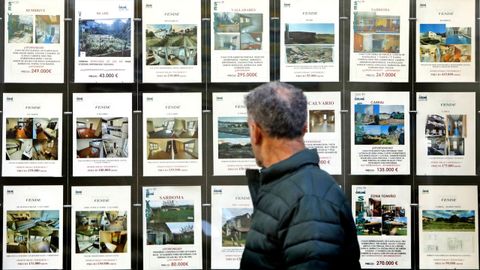
A man is looking for a window of a real estate agency in the center of Vigo. Author: Oscar Vazquez
The regulation imposes restrictions on rent increases, lease extensions for vulnerable families and additional taxes on empty homes
The Law on the right to housingwhich, among other measures, limits the rental price, enters into force tomorrow, Friday the 26th, after the publication of the decree this Thursday in State official gazette, with which it will begin to apply before the regional and municipal elections on Sunday. However, with the entry into force of the tax incentives that will be applied in personal income tax for rent of real estate intended for housing.
The housing law, whose negotiations were unblocked before the next election and after three years of contacts, was definitely approved on May 17 in the Senate by the votes of socialists and pro-independence and left-wing groups that support the coalition government. A month earlier, the text was given the green light by the Congress of Deputies. The text was opposed by the entire spectrum of the right, from PP, Vox and Ciudadanos to nationalist formations such as PNV and PDECat, who first realized that the rule violates private property and makes it difficult to evict squatters and non-payers, and the latter due to the interference of regional authorities in housing questions.
Barely a week after this last parliamentary procedure, the norm was published in BOE. In that period, real estate agencies working with small owners were already noticing a real estate flight from the rental market residential to other forms of rental (tourist apartments) or for sale before the official entry into force of the new law, especially in large cities.
The new law is one of the electoral trump cards for the upcoming elections on May 28. The government has made housing one of its main campaign issues with repeated pre-election announcements ranging from the deal with Sareb to making land available to the Ministry of Defense to promote affordable housing or a series of Public Funds to Buy guarantees that drew rejection from United We Can.
But what changes with the new norm? First, the text introduces restrictions on rent increases. The 2% cap on rent increases will be maintained for this year, a percentage that will rise to 3% at annual lease renewals in 2024. However, the main change will occur in 2025 when a new index will be introduced to replace the CPI as a reference for updating rents so that they rise less than inflation, eliminating the most volatile elements from the calculation.
On the other hand, changes have been made to the definition of “large landlord”, which in the highlighted areas will be those who have five or more properties and who must determine the rent based on the reference price index system. This point will not currently be applicable in Galicia, as the Xunta has ruled out declaring stressed rental areas, so the strictest limit would not apply to property prices in city centers and areas with the highest demand. .
The norm also foresees surcharges between 50 and 150% on real estate tax (IBI) for homes that have been vacant for more than two years, in order to increase rents.
In addition, it allows extraordinary extensions of leases for one year due to proven social or economic vulnerability, prevents evictions without announcing the date and time, and includes new extensions that allow for their postponement, among other measures.
Source: La Vozde Galicia
I am Jason Root, author with 24 Instant News. I specialize in the Economy section, and have been writing for this sector for the past three years. My work focuses on the latest economic developments around the world and how these developments impact businesses and people’s lives. I also write about current trends in economics, business strategies and investments.







